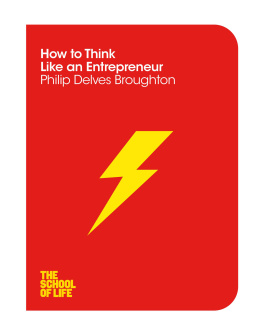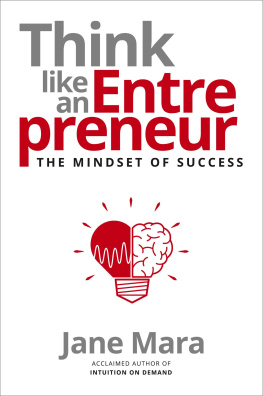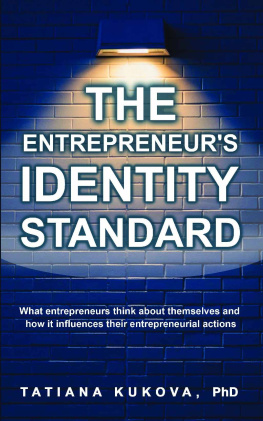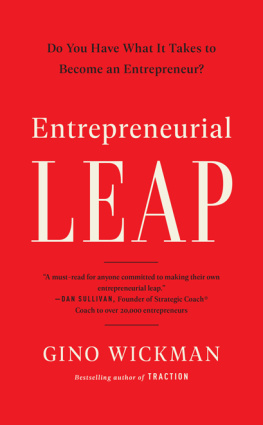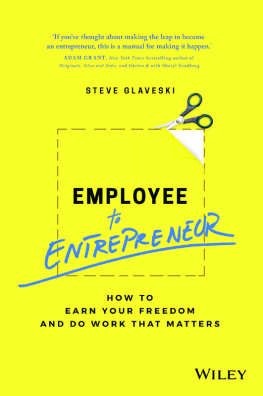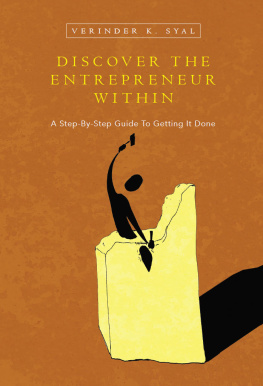How to Think Like
an Entrepreneur
Philip Delves Broughton
MACMILLAN
To Hugo and Augie
Introduction
Most new businesses fail. Most entrepreneurs fail. Even those who succeed suffer through the process. The jaunty, sunny character who first seizes upon an idea and decides to bring it to market soon becomes grizzled by experience, by the violence of the competition, the disdain of investors, the treachery of employees.
Paul Graham, the founder of Y Combinator, one of the more successful of Silicon Valleys entrepreneurial incubator programmes, says the underlying reason most start-ups fail is that they become demoralized. Yet another investor turns them down. Yet another client loses interest. Yet another cheque gets bounced by the stiffs at the bank. Each individual adversity could be dealt with if morale was still high. But once its gone, so goes hope. If you can just avoid dying, Graham says, you get rich.
Yet now more than ever, the life of the entrepreneur is celebrated and desired. Incubators and accelerators from Palo Alto to Brooklyn, from East London to Berlin are humming with ambitious entrepreneurs, confident that they can beat the daunting odds. You could spend every week of the year at a conference where successful entrepreneurs roll onstage in their vintage Adidas and designer jeans to talk of the importance of fast failure and pivoting out of disaster. Given how many presentations Sir Richard Branson seems to make before audiences of adoring entrepreneurs, it is a miracle he has time to run his business.
The economist Daniel Kahneman would say that the phenomenon of the start-up hub, the busy cafes of Hoxton Square in London or University Avenue in Palo Alto, lead to an acute case of WYSIATI What You See Is All There Is. If you are surrounded by others doing the same thing as you, a few successfully but all with a good degree of swagger, you tend to ignore the risks of your undertaking. Your head swims with stories of billion dollar exits, of acquisitions by technology giants, and before you know it you dont worry about buying an expensive coffee with an expensive credit card for a meeting that may go nowhere. All those TED talks you watch about risk-taking and abundance, about avoiding a life of quiet desperation and embarking on that entrepreneurial adventure, are a contagious form of ignorance.
Kahneman writes:
The emotional, cognitive and social factors that support exaggerated optimism are a heady brew, which sometimes lead people to take risks that they would avoid if they knew the odds. There is no evidence that risk takers in the economic domain have an unusual appetite for gambles on high stakes; they are merely less aware of risks than more timid people are.
The optimism of entrepreneurs, he says, is widespread, stubborn and costly.
If there was any honesty among those who teach and promote entrepreneurship, they would tear down the inspiring quotes pasted up on their office walls and replace them with pictures of people being rejected at cashpoints. They would hand out T-shirts saying: You built a food-delivery app to change the world and all you got was this lousy eviction notice. That would be more consistent with the facts of entrepreneurial risk-taking.
But they dont because there are countervailing forces at work. There is the profound psychological need which entrepreneurship can satisfy. To succeed as an entrepreneur is a form of heroic achievement in any economy, but particularly a vigorous market economy. To become a multibillionaire through your own endeavour affords you fawning respect, invitations to state dinners, honorary doctorates, Hollywood biopics.
Entrepreneurship offers a way out of corporate life, out of a system of task-and-reward allocation run by others, to one run by you. You get to decide how to work, what to work on, and how to divide the rewards. If you would rather wear your skivvies instead of a suit, forego all meetings and work via Skype from the beach, you can assuming your investors and employees still trust you to make your business fly. At the very least, when you find yourself hauled out of bed early on a weekend morning, or taking that last, grey flight home on a Friday night, you can know you are doing it for yourself rather than at the whim of another.
But entrepreneurship also allows individuals a shot at the even deeper pleasure of doing work that they cannot do while working for others. It provides a way to innovate, to challenge whatever currently prevails and to let your originality flourish.

Barbecue fuels the optimism of East Londons start-up scene.
If you are a medical researcher and you know a new drug could help thousands of people, but not enough to make commercial sense for the pharmaceutical company you work for, entrepreneurship offers you a path. If you are a chef chafing on the line, yearning to create dishes which exist only in your imagination, finding investors and opening your own restaurant is a way to turn that yearning into action. If you are a young musician struggling to be heard, you can make your own recordings and distribute them yourself. If you are an ambitious politician, an African American, say, who has served only two years in the US Senate but think you have a long-shot at the White House, it takes entrepreneurial thinking to orchestrate a successful campaign.
Entrepreneurship is a powerful means of arranging life to enable ones fulfilment, and it is this ineffable opportunity which colours peoples view of its risks. Business is often wrongly seen as a set of rational processes. Entrepreneurship gives emotion its proper place.
And before we plunge in, let me offer one more kink in our understanding of entrepreneurial thinking. When Daniel Kahneman wrote that optimism was dangerous for entrepreneurs, he added that it was most dangerous when it came to making the decision to launch a venture. Once the venture was underway, optimists tended to do better than pessimists: Confidence in their future success sustains a positive mood that helps them obtain resources from others, raise the morale of their employees, and enhance the prospects of prevailing. When action is needed, optimism, even of the mildly delusional variety, may be a good thing.
A few years ago, an old friend received millions of dollars of venture-capital investment in his new company, which was barely a few weeks old. He was frazzled with anxiety and excitement. As we sat in his car after dinner, he could barely stay still, his fingers drumming the steering wheel, his thoughts racing out ahead of him. He held out his palm, pointed at it and said in an excited whisper: I feel like Im holding a tiny dragon. All I have to do is not fuck it up.
To think like an entrepreneur is to journey through this mazy terrain between optimism and despair: optimism engendered by the thrill of self-actualization which occurs when you start and manage a successful enterprise; and despair at the difficulties which this entails and the corpses which litter your path. It is a journey many people are eager to travel and for which this book is intended as a guide.
The most widely accepted modern definition of entrepreneurship was coined by Howard Stevenson, a professor at Harvard Business School. It states that Entrepreneurship is the pursuit of opportunity without regard to resources currently controlled. The appeal of this definition is as much in what it leaves out as in what it contains. It does not contain the word risk because Stevenson felt that most entrepreneurs do not see themselves as risk-junkies. They are willing to take the risks necessary to achieve their often difficult goals, but they abhor pointless risk. Gustave Flaubert advised that artists should be regular and orderly in your life like a bourgeois, so that you may be violent and original in your work. He might just as well have been advising entrepreneurs.
Next page
